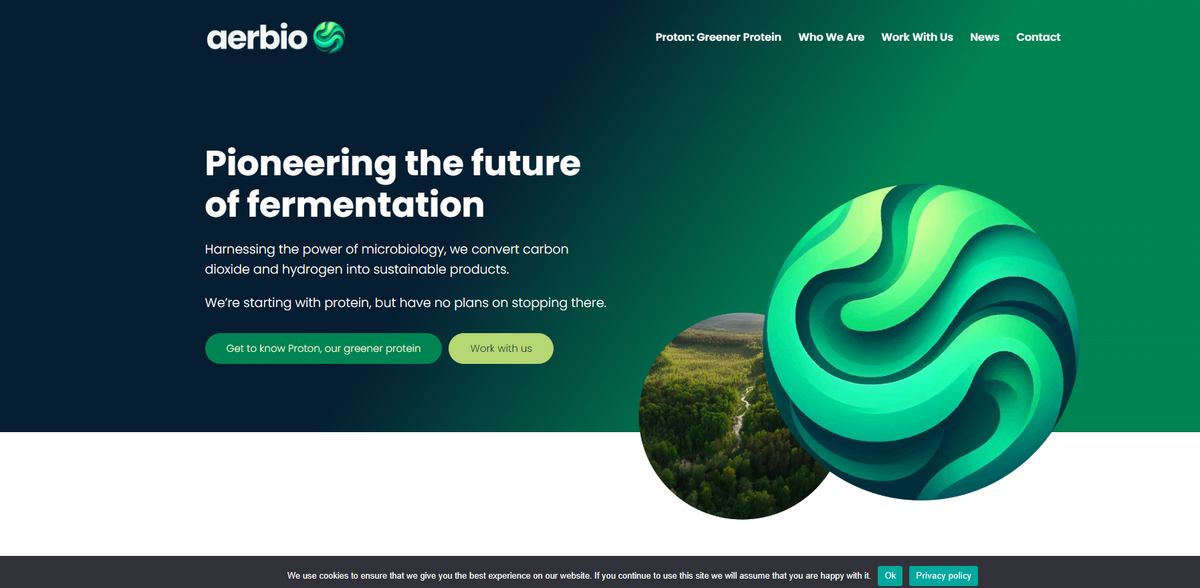What is the Aerbio Project?
Aerbio is pioneering the future of fermentation by harnessing the power of microbiology to transform carbon dioxide and hydrogen into sustainable products. The project’s focus starts with a revolutionary protein ingredient known as Proton™ that is derived from naturally occurring microorganisms. With a bold vision for a sustainable food system, Aerbio is reimagining how fermentation can fuel new ways to produce protein without relying on traditional agricultural methods. Simple molecules—carbon dioxide, hydrogen, oxygen, nitrogen, and electrolytes—are the building blocks of this innovative process, setting the stage for an eco-friendly solution that challenges the status quo of plant and animal protein production. It is a process that produces a milk-like broth, subsequently de-watered and dried into Proton™ powder boasting over 70% protein content, all while ensuring year-round, weather-independent production.
Main Benefit of the Technology
The Aerbio project’s main benefits lie in its impressive key figures and breakthrough process:
- Complete amino acid profile with 70% protein content
- Year-round production from sustainable, scalable inputs
- A staggering 90% reduction in carbon footprint compared to conventional plant-based or animal proteins
- Revolutionary (R)evolve™ technology, ensuring high batch consistency and traceability
- An eco-friendly gas fermentation process using carbon dioxide and hydrogen in a continuous cycle
The Future of Fermentation
This project leads the charge in a new era of fermentation—one that ditches the traditional reliance on sugars for both carbon and energy. The (R)evolve™ technology builds on long-standing fermentation traditions but decisively breaks free from the conventional mold by utilizing carbon dioxide and hydrogen. The process mimics nature’s own operations, much like plants converting these simple elements into complex molecules such as carbohydrates, fats, and proteins. It is an approach that not only challenges the norm but also emphasizes a continuous, efficient cycle where molecular inputs are replenished at the very pace they are consumed… a futuristic leap that makes sustainable protein production a tangible reality.
Transforming the Food System
New proteins are essential in constructing a carbon-neutral food system. Aerbio’s vision is clear: a sustainable food production process that doesn’t depend solely on farmland. Conventional reliance on animal and plant proteins often contributes to deforestation, overfishing, and environmental degradation. In contrast, Proton™ emerges as a groundbreaking alternative that redefines animal feed and human food applications alike. Its near-neutral taste and high protein content present a novel means to nourish individuals and livestock, while simultaneously reducing environmental impacts. The transformation is significant—a redefinition of industrial fermentation that works across diverse applications, turning everyday molecules into premium ingredients that have the power to reshape global food systems.
Innovative Production Technology
The technology behind Proton™ reflects a leap forward in industrial biotechnology. Employing an aerobic gas fermentation method, the technology allows microbes to thrive on carbon dioxide and hydrogen instead of sugars. During this process, gases are dissolved into a water-based solution enriched with oxygen, nitrogen, and electrolytes, creating an optimal environment for microbial growth. As these microbes multiply, they accumulate high concentrations of protein in their cells—all while maintaining an efficient equilibrium where inputs are replenished as they are consumed. The production facility, anchored by Aerbio’s pilot-scale operations, showcases a mobile pilot unit and scaled-up process that not only minimizes waste but also secures continuous, reliable production. This innovative cycle of production ensures that the final Proton™ powder is a consistent and eco-friendly solution for sustainable food production.
Project Impact on Sustainable Development Goals
- SDG 2: Zero Hunger – by establishing a reliable source of protein for food and feed applications
- SDG 7: Affordable and Clean Energy – through the use of renewable energy in production processes
- SDG 12: Responsible Consumption and Production – with scalable and efficient production methods
- SDG 13: Climate Action – via an innovative process that slashes the carbon footprint by 90%
- SDG 15: Life on Land – by reducing the pressure on traditional farming practices and deforestation
Collaborative Partnerships and Future Prospects
A distinguishing factor of this project is its collaborative spirit. Aerbio works in close alliance with industry leaders, cutting-edge feedstock suppliers, and engineering partners to scale its pioneering technology. Joint development efforts extend to top universities, where enhanced understanding of product applications and production processes is continuously pursued. These partnerships not only foster innovation but also create new value chains aimed at decarbonizing the food system. The cooperative approach ensures that advances in sustainable protein production yield benefits that are both broad and impactful. Through robust collaborations, the future of fermentation and sustainable food production looks set to make a transformative impact—demonstrating that technology, sustainability, and efficiency can indeed go hand in hand.


















